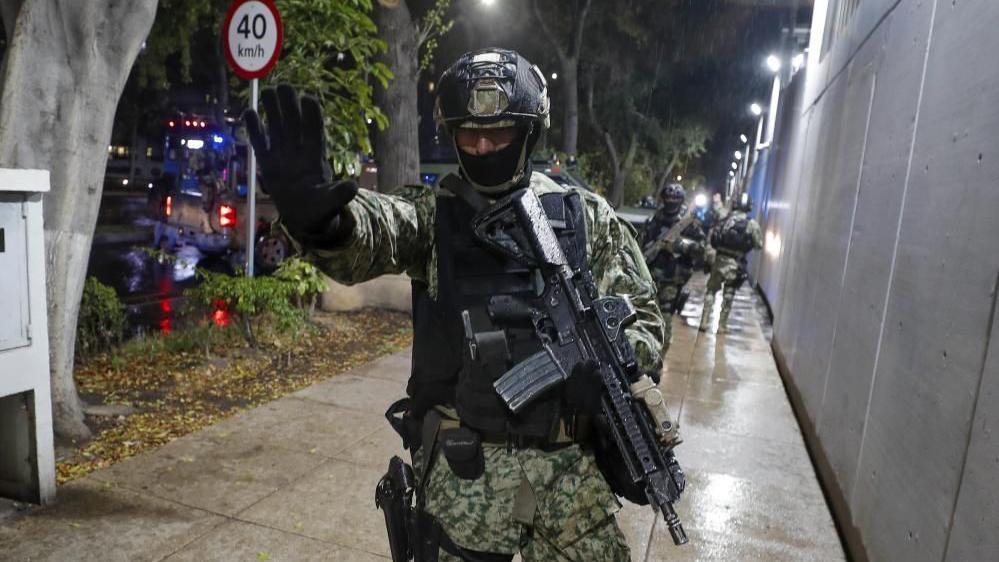Mexican President Sheinbaum to Propose Constitutional Reforms to Protect Sovereignty Amid U.S. Concerns
Published on October 2023
Introduction
Mexican President Claudia Sheinbaum has taken a definitive stand to bolster her country’s sovereignty amidst growing concerns over U.S. military actions targeting local drug cartels. On Thursday, Sheinbaum announced her intention to introduce constitutional reforms aimed at safeguarding Mexico’s national integrity in light of escalating tensions triggered by U.S. designations of certain cartels as foreign terrorist organizations.
Context of the Announcement
This declaration comes amidst fears that the Trump administration, which previously labeled six Mexican drug cartels as foreign terrorist organizations, could potentially create a pretext for U.S. military interventions in Mexico. Such actions may mirror decades of foreign military involvement in regional conflicts, spurring outrage and a call for increased national defense measures.
Sheinbaum’s Stance on Sovereignty
In her remarks, President Sheinbaum made it emphatically clear that **”the Mexican people will not accept, under any circumstances, any intervention, interference, or foreign actions that threaten the integrity, independence, and sovereignty of our nation.”** This resolute statement underlines her commitment to protecting Mexico’s autonomy and upholding the nation’s dignity on the international stage.
Details of the U.S. Designation
The U.S. list of designated terrorist organizations includes notorious groups such as the **Sinaloa**, **Jalisco**, **Zetas**, **Gulf Cartels**, **Cartel Unidos**, and **”La Nueva Familia Michoacana.”** Additionally, it also targets the **Tren de Aragua** from Venezuela and the infamous Salvadoran gang **Mara Salvatrucha (MS-13).** This classification has stirred controversy not only within Mexico but also raised ethical questions regarding the U.S.’s approach to foreign policy and counter-terrorism.
Mexico’s Historical Opposition
Historically, Mexico has stood firmly against the characterization of drug cartels as foreign terrorist organizations. Officials have argued that such designations are made unilaterally without due consultation with Mexico, undermining its sovereignty. In her statement, Sheinbaum reiterated this point, emphasizing that Mexico was not consulted in the U.S. administration’s decisions and that defending the nation’s sovereignty is a non-negotiable principle.
Legal Restrictions and Future Proposals
Sheinbaum’s proposals build upon the groundwork laid by her predecessor, **former President Andrés Manuel López Obrador,** who had already instituted legal restrictions limiting foreign interventions and operations in Mexican territory. Sheinbaum plans to fortify these legal frameworks by embedding them in the Mexican constitution, ensuring robust oversight over any foreign agents operating within the country. “**We want to be absolutely clear—sovereignty is not up for negotiation,**” she stressed, asserting her determination to safeguard the nation’s interests.
Measures Against Weapons Trafficking
Complementing her sovereignty reforms, Sheinbaum also unveiled proposals for a second constitutional reform aimed at imposing harsher penalties for both Mexican nationals and foreigners involved in weapons trafficking. The president highlighted how the illicit smuggling of firearms from the U.S. into Mexico exacerbates cartel violence, and expressed dissatisfaction with the limited measures currently being enacted by U.S. authorities to combat this issue.
Conclusion
Claudia Sheinbaum’s announcement represents a significant pushback against perceived threats to Mexico’s autonomy while seeking to strengthen internal legal frameworks to address cartel violence and foreign intervention. It reaffirms Mexico’s commitment to independence amid external pressures, positioning the country on a path toward greater self-determination and the protection of its sovereignty in the face of international challenges. The developments signal a new chapter in Mexico-U.S. relations, with implications that could reshape cooperative security efforts and influence the landscape of Regional diplomacy.
